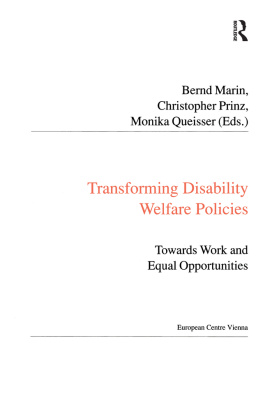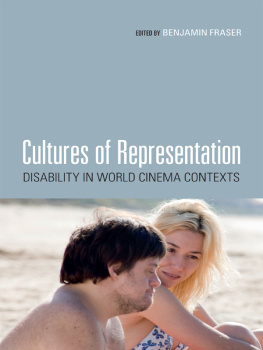First published 2003 by Ashgate Publishing
Reissued 2018 by Routledge
2 Park Square, Milton Park, Abingdon, Oxon OX14 4RN
711 Third Avenue, New York, NY 10017, USA
Routledge is an imprint of the Taylor & Francis Group, an informa business
Copyright European Centre Vienna, 2003
All rights reserved. No part of this book may be reprinted or reproduced or utilised in any form or by any electronic, mechanical, or other means, now known or hereafter invented, including photocopying and recording, or in any information storage or retrieval system, without permission in writing from the publishers.
Notice:
Product or corporate names may be trademarks or registered trademarks, and are used only for identification and explanation without intent to infringe.
Publishers Note
The publisher has gone to great lengths to ensure the quality of this reprint but points out that some imperfections in the original copies may be apparent.
Disclaimer
The publisher has made every effort to trace copyright holders and welcomes correspondence from those they have been unable to contact.
Copy-editing and DTP: Willem Stamatiou
A Library of Congress record exists under LC control number: 2003545090
ISBN 13: 978-1-138-72658-1 (hbk)
ISBN 13: 978-1-315-19131-7 (ebk)
Bernd Marin
European Centre Work on Disability Welfare
Since many years, the European Centre has been actively involved in studying disability issues and suggesting ideas as how to improve living conditions of people with impairments as well as effectiveness of policies towards persons with handicaps. Recently, its programme on Ageing, Care Policies, and Social Services has contributed to the comparative study Definitions of Disability in Europe: A Comparative Analysis, financed by the Commission of the European Communities, DGV, and coordinated by Brunei University, United Kingdom (Giedenbacher/Strmpel, 2001). Another most recent study on Labour Market Policies in Favour of Disabled People, Migrant Workers and Women in Nine Countries, carried out for the University of Leuven (for submission to the Government of Flanders) was completed in early 2003.
In the second half of the 1990s, the Autonome Provinz Bozen / Provincia Autonoma di Bolzano, Regione Trentino - Alto Adige commissioned the establishment of a new care allowance scheme, which should combine the best practices of the Austrian, German and the Luxembourg institutions, to the European Centre: the Centre designed a new Pflegeversicherung / La copertura previdenziale per non autosufficienti institutionally, prepared a care allowance/ disability classification scheme, accompanied its implementation scientifically, and evaluated the first steps of this institutional innovation in the years 2000 to 2002 (Leichsenring/Prinz, 1997; Leichsenring, 2001a, b). With respect to its interest in and competence regarding care allowance regulations in a comparative European perspective, the European Centre has already been active in the early 1990s in contributing to prepare the establishment of a Pflegegeldgesetz in the Host Country (Evers/Leichsenring/Pruckner, 1992; Evers/Pijl/Ungerson, 1994).
Another study on Social Public Services: Quality of Working Life and Quality of Services, commissioned by the European Foundation for the Improvement of Living and Working Conditions, Dublin, has been com-pleted in 1999. In the mid-1990s, employment policies for people with dis-abilities, questions of mandatory employment or equal opportunities (Leichsenring/Strmpel, 1995), of vocational integration of persons with disabilities (Leichsenring/Strmpel, 1997), the working and housing conditions of persons with disabilities, in particular alternatives to nursing homes (Leichsenring/Strmpel/Groupe Saumon, 1998), better care for dependent people living at home (Evers/van der Zanden, 1993), organizational responses to HIV and AIDS-management (Kenis/Marin, 1997), clients rights (Evers/Leichsenring/Strmpel, 1995) and developing quality in personal social services (Evers et al., 1997), as well as new housing and living experiments of persons with mental disabilities have been investigated, both on the level of single provinces as well as in a European comparative perspective (Leichsenring /Strmpel /Groupe Saumon, 1998).
Currently, within the framework of the European Union LEONARDO-programme, a project on Stakeholders Views of Supported Employment Initiatives - Quality Criteria and Development is under way: case studies of suppliers of supported employment programmes in five European (Eu-ropean Union, accession, and non-EU-OECD) countries, namely the United Kingdom, Austria, Norway, the Czech Republic and Hungary are carried-out in order to test which quality criteria are most relevant for which of the stakeholders such as labour force participants with disabilities, employees of service providers, employers, and financial supporters. The mix of coun-tries chosen allowed for cross-national comparisons of and an interesting exchange of experiences between countries with highly divergent philoso-phies and institutions of supported employment programmes, as has been demonstrated by the final concluding conference in October 2002 in Buda-pest (Strmpel et al., 2002).
Towards the end of 1998, after successfully bidding for a tender by the Swiss Federal Office of Social Insurance (Bundesamt fr Sozialversicherung, Bern) on Invalidenversicherung: Europische Entwicklungstendenzen zur Invaliditt im Erwerbsalter, the European Centres programme on Social Policy Modelling has started to look into developments in disability pension policies throughout Europe (Prinz, 1999). Originally, seven countries have been covered; in a second round by extending the original investigation towards a broader domain, four more countries have been additionally included so that the following countries are now being taken into account in analysing disability pensions in Europe: Austria, Denmark, Finland, Germany, Italy, Netherlands, Norway, Poland, Slovenia, Sweden, and Switzerland.
The resulting series of 11 country case studies prepared by national experts on the basis of a unified framework are assembled in this collected volume. With respect to comparative lessons to be drawn, a few insights are systematically reviewed in a theoretical chapter in this book (Chapter by Philip R. de Jong), where a conceptual framework on disability insurance is developed and illustrated if not tested by empirical evidence from the country studies. A more comprehensive view on disability welfare policy achievements and failures and more systematic comparative analysis - thereby drawing extensively on material published recently by the OECD (see below) - is presented in the introduction to this book (Chapter by Bernd Marin). Some findings to be generalized and some wider policy conclusions to be derived from, yet smaller, comparative empirical material were already to be found in another book published earlier (Prinz, 1999a).













